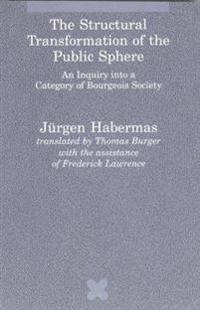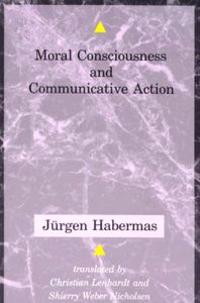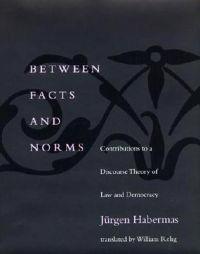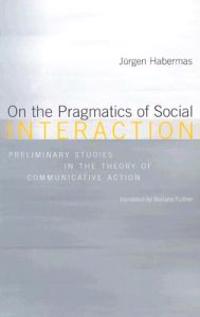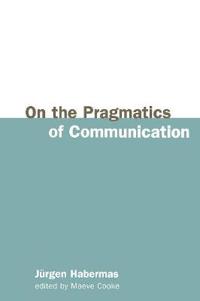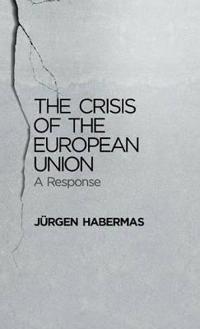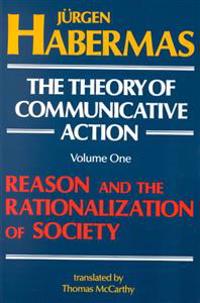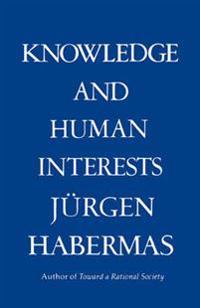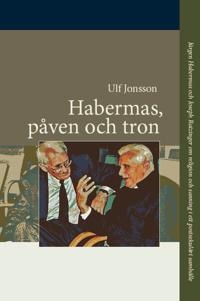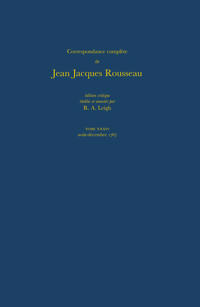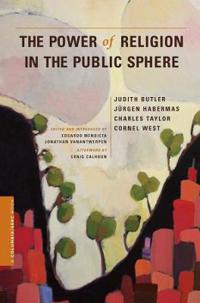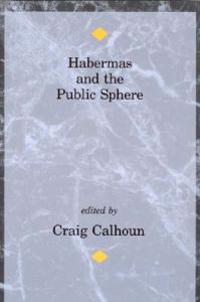The Structural Transformation of the Public Sphere: An Inquiry Into a Category of Bourgeois Society (Häftad)
avJurgen Habermas, J?rgen Habermas, J. Rgen Habermas
ISBN: 9780262581080 - UTGIVEN: 199108This is Jurgen Habermas's most concrete historical-sociological book and one of the key contributions to political thought in the postwar period. It will be a revelation to those who have known Habermas only through his theoretical writing to find his later interests in problems of legitimation and [...]
Moral Consciousness and Communicative Action: Copernicus and Kepler (Häftad)
avJurgen Habermas, J?rgen Habermas, J. Rgen Habermas
ISBN: 9780262581189 - UTGIVEN: 199210This long-awaited book sets out the implications of Habermas's theory of communicative action for moral theory. "Discourse ethics" attempts to reconstruct a moral point of view from which normative claims can be impartially judged. The theory of justice it develops replaces Kant's categorical impera[...]
Justification and Application: Remarks on Discourse Ethics (Häftad)
avJurgen Habermas, J?rgen Habermas, J. Rgen Habermas
ISBN: 9780262581363 - UTGIVEN: 199409This collection of four essays and an interview contains Habermas's most recent contributions to ethical theory. It expands and clarifies the work on discourse ethics presented in Moral Consciousness and Communicative Action. Here, largely in response to criticisms from contemporary neo-Aristotelian[...]
Between Facts and Norms: Contributions to a Discourse Theory of Law and Democracy (Häftad)
avJurgen Habermas, J?rgen Habermas, J. Rgen Habermas
ISBN: 9780262581622 - UTGIVEN: 199801In Between Facts and Norms Jurgen Habermas works out the legal and political implications of his Theory of Communicative Action (1981), bringing to fruition the project announced with his publication of The Structural Transformation of the Public Sphere in 1962. This new work is a major contribution[...]
On the Pragmatics of Social Interaction: Preliminary Studies in the Theory of Communicative Action (Häftad)
avJurgen Habermas, J?rgen Habermas, J. Rgen Habermas
ISBN: 9780262582131 - UTGIVEN: 2002-01In 1971 Jurgen Habermas delivered the Gauss Lectures at Princeton University. These pivotal lectures, entitled "Reflections on the Linguistic Foundation of Sociology," anticipate The Theory of Communicative Action and offer an excellent introduction to it. They show why Habermas considers the lingui[...]
The Philosophical Discourse of Modernity: Twelve Lectures (Häftad)
avJurgen Habermas, J?rgen Habermas, Thomas McCarthy
ISBN: 9780262581028 - UTGIVEN: 1990-03This critique of French philosophy and the history of German philosophy is a tour de force that has the immediacy and accessibility of the lecture form and the excitement of an encounter across national cultural boundaries as Habermas takes up the challenge posed by the radical critique of reason in[...]
On the Pragmatics of Communication (Häftad)
avHabermas, Jurgen Habermas
ISBN: 9780745630472 - UTGIVEN: 200209This volume brings together Habermas's key writings on language and communication. Including some classic texts as well as new material which is published here for the first time, this book is a detailed and up-to-date introduction to Habermas's formal pragmatics, which is a vital aspect of his soci[...]
The Crisis of the European Union (Inbunden)
avJurgen Habermas, Ciaran Cronin, Jurgen Habermas
ISBN: 9780745662428 - UTGIVEN: 201205Translated by Ciaran Cronin. In the midst of the current crisis that is threatening to derail the historical project of European unification, Jurgen Habermas has been one of the most perceptive critics of the ineffectual and evasive responses to the global financial crisis, especially by the Germ[...]
The Theory of Communicative Action: Volume 2: Lifeword and System: A Critique of Functionalist Reason (Häftad)
avJurgen Habermas, Juergen Habermas
ISBN: 9780807014011 - UTGIVEN: 198503Juergen Habermas opens Volume 2 with a brilliant reinterpretation of Mead and Durkheim and then develops his own approach to society, combining two hitherto competing paradigms, "system" and "lifeworld." The strength of this combination is then demonstrated in a detailed critique of Parsons's theory[...]
The Theory of Communicative Action: Volume 1: Reason and the Rationalization of Society (Häftad)
avJurgen Habermas, Juergen Habermas
ISBN: 9780807015070 - UTGIVEN: 198503"The THEORY OF COMMUNICATIVE ACTION represents a major contribution tocontemporary social theory.Not only does it provide a compelling critique of some of the main perspectives in 20th century philosophy and social science, but it also presents a systematic synthesis of the many themse which have pr[...]
Knowledge & Human Interests (Häftad)
avJurgen Habermas, Juergen Habermas
ISBN: 9780807015414 - UTGIVEN: 197202Toward a Rational Society: Student Protest, Science, and Politics (Häftad)
avJurgen Habermas, Juergen Habermas
ISBN: 9780807041772 - UTGIVEN: 1968-12Knowledge, communication, action - These are the concepts central to all of Habermas's thought. As a philosopher, he is concerned with the rational connections of these concepts. As a sociologist, he is prepared to analyze with care the distortions of human interactions caused by existing social and[...]
Habermas, påven och tron : Jürgen Habermas och Joseph Ratzinger om religion (Häftad)
avUlf Jonsson
ISBN: 9789175804255 - UTGIVEN: 200906Religionen tycks ha gjort comeback i globaliseringens kölvatten. Vi lever inte längre i ett sekulärt, utan i ett postsekulärt tidevarv.
Men vad betyder detta för religionens plats i dagen kultur och samhällsliv? Hur ska relationen mellan kyrka och stat se ut? Vilken roll kan samfund[...]Habermas (Häftad)
avJames Gordon Finlayson
ISBN: 9780192840950 - UTGIVEN: 200505This book gives a clear and readable overview of the philosophical work of Jurgen Habermas, the most influential German philosopher alive today, who has commented widely on subjects such as Marxism, the importance and effectiveness of communication, the reunification of Germany, and the European Uni[...]
Reading After Freud: Essays on Goethe, Holderlin, Habermas, Nietzsche, Brecht, Celan and Freud (Övrig)
avRainer Nagele
ISBN: 9780231062862 - UTGIVEN: 1987-04-16The Power of Religion in the Public Sphere (Inbunden)
avJudith Butler, Jurgen Habermas, Charles Taylor
ISBN: 9780231156455 - UTGIVEN: 2011-02The Power of Religion in the Public Sphere represents a rare opportunity to experience a diverse group of preeminent philosophers confronting one pervasive contemporary concern: what role does--or should--religion play in our public lives? Reflecting on her recent work concerning state violence in I[...]
The Power of Religion in the Public Sphere (Häftad)
avJudith Butler, Jurgen Habermas, Charles Taylor
ISBN: 9780231156462 - UTGIVEN: 201102The Power of Religion in the Public Sphere represents a rare opportunity to experience a diverse group of preeminent philosophers confronting one pervasive contemporary concern: what role does--or should--religion play in our public lives? Reflecting on her recent work concerning state violence in I[...]
The Habermas-Rawls Debate
ISBN: 9780231164108 - UTGIVEN: 2019-05J rgen Habermas and John Rawls are perhaps the two most renowned and influential figures in social and political philosophy of the second half of the twentieth century. In the 1990s, they had a famous exchange in the Journal of Philosophy. Quarreling over the merits of each other's accounts of the s[...]
The Habermas Handbook
ISBN: 9780231166423 - UTGIVEN: 2017-10Jurgen Habermas is among the most influential philosophers of our time. His diagnosis of contemporary society and concepts such as the public sphere, communicative rationality, and cosmopolitanism have influenced virtually all academic disciplines, spurred political debates, and shaped intellectual [...]
Cogent Science in Context: The Science Wars, Argumentation Theory, and Habermas (Övrig)
avWilliam Rehg (S. J.)
ISBN: 9780262182713 - UTGIVEN: 2009-01-13Recent years have seen a series of intense, increasingly acrimonious debates over the status and legitimacy of the natural sciences. These "science wars" take place in the public arena--with current battles over evolution and global warming--and in academia, where assumptions about scientific object[...]
Cogent Science in Context: The Science Wars, Argumentation Theory, and Habermas (Övrig)
avWilliam Rehg (S. J.)
ISBN: 9780262516600 - UTGIVEN: 2011-09-23Recent years have seen a series of intense, increasingly acrimonious debates over the status and legitimacy of the natural sciences. These "science wars" take place in the public arena--with current battles over evolution and global warming--and in academia, where assumptions about scientific object[...]
Habermas and the Public Sphere (Häftad)
ISBN: 9780262531146 - UTGIVEN: 199304The relationship between civil society and public life is in the forefront of contemporary discussion. No single scholarly voice informs this discussion more than that of Jurgen Habermas. His contributions have shaped the nature of debates over critical theory, feminism, cultural studies, and democr[...]
On the Logic of the Social Sciences (Övrig)
avJurgen Habermas
ISBN: 9780262581042 - UTGIVEN: 1990-10-10For two decades the German edition of this book has been a standard reference point for students of the philosophy of the social sciences in Germany. Today it still stands as a unique and masterful guide to the major problems and possibilities in this field.On the Logic of the Social Sciences foresh[...]
The Inclusion of the Other: Studies in Political Theory (Häftad)
avJurgen Habermas, Pablo De Greiff, Ciaran Cronin
ISBN: 9780262581868 - UTGIVEN: 200001edited by Ciaran Cronin and Pablo De Greiff Since its appearance in English translation in 1996, JA1/4rgen Habermas's Between Facts and Norms has become the focus of a productive dialogue between German and Anglo-American legal and political theorists. The present volume contains ten essays that pro[...]

